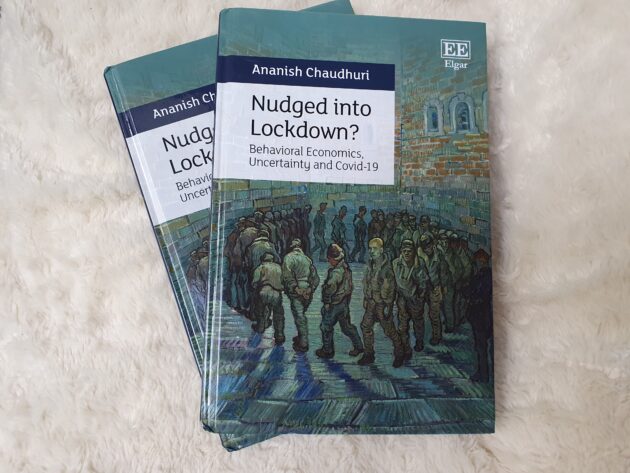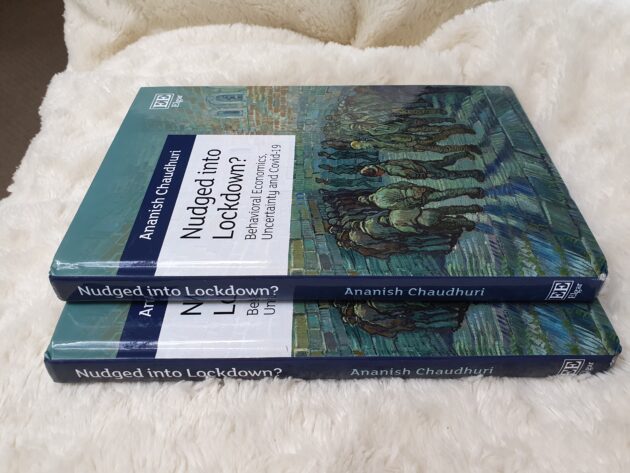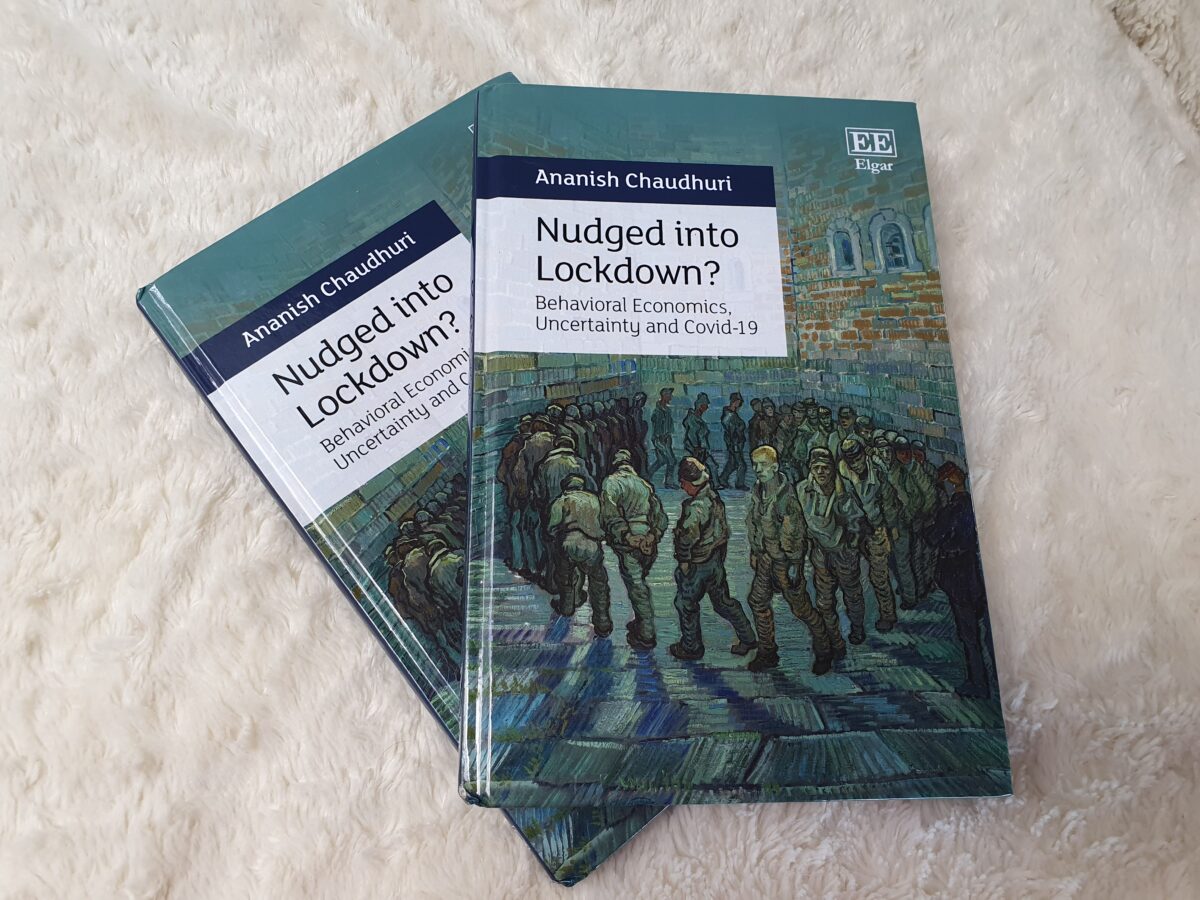We are running another fantastic giveaway for our members.
The prizes are two signed, hardback copies of Nudged into Lockdown? Behavioral Economics, Uncertainty and Covid-19 by BFD author Ananish Chaudhuri.

Utilizing extensive research in economics, psychology, political science, neuroscience and evolutionary theory, Ananish Chaudhuri provides a critical perspective on the role of cognitive biases in decision-making during the Covid-19 pandemic. The extensive use of, and support for, stringent social distancing measures, in particular, is explored in depth.
Nudged into Lockdown? provides clear explanations of complex scientific information regarding Covid-19, vaccines, and policy responses, to highlight issues at the centre of policy-making during the pandemic. With a comprehensive overview of the policy debates around Covid-19, the book offers an alternative thought-provoking perspective on the topic, as well as suggestions for policy-making during future pandemics and other crises. It further highlights applications of a range of concepts from heuristics and biases literature, including priming, framing, anchoring, Prospect Theory, and loss aversion.
Providing directions for future research in the area, this book will be an invigorating read for established academics, as well as postgraduate students looking to undertake research in Covid-19 related decision-making. It will also be a critical read for economics, political science, and public policy scholars seeking a deeper understanding of the topic.
On the 8th of June, we will give away two copies to two lucky BFD members. We will use an online random number generator to select the winners from our membership base and then we will contact the winners via e-mail.
If you are already a member then relax, you are already in the draw.
Thanks for all your support, we couldn’t do what we do without our members.
If you aren’t a member already then sign up for one of our membership plans to be in the draw for a copy of the book.
Endorsements:
Nudged into lockdown? Behavioural Economics, Uncertainty and Covid-19 Ananish Chaudhuri (Edward Elgar)
In responding to the novel coronavirus pandemic, most governments abandoned the existing scientific and policy consensus and mimicked one another to embrace lockdowns of varying stringency. Remarkably, hardly any seemed to produce cost-benefit analysis. Unremarkably, the cost-benefit balance varied between rich and poor countries.
In this rigorous, multi-disciplinary examination written in clearly accessible language, Ananish Chaudhuri explores the reasons for the herd-like behaviour by governments and for the public compliance with their edicts. A must-read for understanding what really happened with COVID-19 and why, and for being better prepared for the inevitable next pandemic.
Ramesh Thakur.
Director of the Centre for Nuclear Non-Proliferation and Disarmament (CNND), Crawford School, The Australian National University. Vice Rector and Senior Vice Rector of the United Nations University and Assistant Secretary-General of the United Nations 1998–2007.
This book is at once scholarly and readily accessible to all. The case Chaudhuri makes is not for any specific policy response, but rather for rational and fully informed decisions – for epidemiology over ideology.
If the careful logic and vivid illustrations here pry open enough minds, we will be far better prepared for the next great public health crisis than we were for COVID-19.
David L. Katz, MD, MPH. President, True Health Initiative. Founding Director, Yale-Griffin Prevention Research Center, Yale University, 1998-2019
In response to the Covid pandemic, many countries adopted containment policies that did not condition on peoples’ health status or demographic characteristics. This timely and insightful book addresses the questions of what considerations led to those policies and whether those policies were well-informed.
The book begins from the premise that the design of effective policy cannot be based solely on the insights of classic epidemiology models. The reason is both simple and sensible: those models don’t take into account behavioral responses of people to policies like containment.
The author’s analysis is multidisciplinary in nature, blending economics, psychology, political science and epidemiology. The result is a rich and informative analysis. I highly recommend this well written and timely book.
Martin Eichenbaum. Charles Moskos Professor of Economics; Co-Director, Center for International Macroeconomics, Northwestern University.
Professor Chaudhuri lays out the many irrationalities involved in the support for lockdowns in New Zealand and elsewhere: an inability to judge small probabilities, the problems with gut feelings, and many ex-post justification biases.
Ananish lays out the argument carefully and yet manages to retain great humanism and compassion. A delight to read.
Paul Frijters. Professor in Wellbeing Economics, London School of Economics and Co-author of “An Economic Theory of Greed, Love, Groups, and Networks”
This book is a very timely one for those, like me, who believe the democratic world’s lockdown response to the Covid virus will go down as the worst public policy response of the last few centuries. It is sceptical. It is interesting. It is Great Barrington over Chief Medical Officer.
There is more to living and the good life than fear of dying of Covid. All the politicians who focused on that matrix, and ignored other causes of death as well as all the benefits of living in a free society, and more, should have to read this book.
James Allan. Garrick Professor in Law, TC Beirne School of Law. University of Queensland.
In this book Ananish Chaudhuri achieves the impossible – he offers an easy to read book that delivers profound insights about our behavior which applies not just to pandemics, but to many other recurrent situations in our daily lives! A must read for anyone that wants to make better decisions.
Sudipta Sarangi. Professor and Chair, Department of Economics, Virginia Tech. Co-Editor, Journal of Economic Behavior and Organization. Author of “The Economics of Small Things”
Careful comparison of costs and benefits is usually considered a hallmark of wise decision-making. Yet in 2020 many governments abandoned this standard as they tried to minimize deaths from Covid-19 regardless of cost. Traditional cost-benefit arguments were rebuked, by politicians who by nature rarely admit error, but also by ordinary folk affronted that someone would want to ‘kill granny’.
This book draws insights from experimental economics, political science and psychology to show how various biases in decision-making processes contributed to this situation. Fifty years ago, Essence of Decision lead a generation of scholars to examine models of government decision-making. Hopefully Ananish Chaudhuri’s lively book has a similar impact, for scholars, students and members of the public concerned about the retreat from rationality that is revealed by policy choices and public attitudes in the Covid-19 era.
John Gibson, Professor of Economics, University of Waikato. Fellow of the Royal Society of New Zealand; Distinguished Fellow of the New Zealand Association of Economists
This is an excellent book that nicely discusses cutting-edge applications in behavioural economics pertaining to the Covid-19 pandemic. It is thought-provoking and contains pioneering approaches that broaden the scope of behavioural research. Excellent writing style, making the content of the book accessible to a broad audience. Highly recommended!
Michalis Drouvelis. Professor of Economics, University of Birmingham. Co-ordinating Editor, Theory and Decision.

Type: Hard Cover
Pages: 256
BUY NOW from e-elgar.com/shop/gbp/nudged-into-lockdown-9781802205664.html

